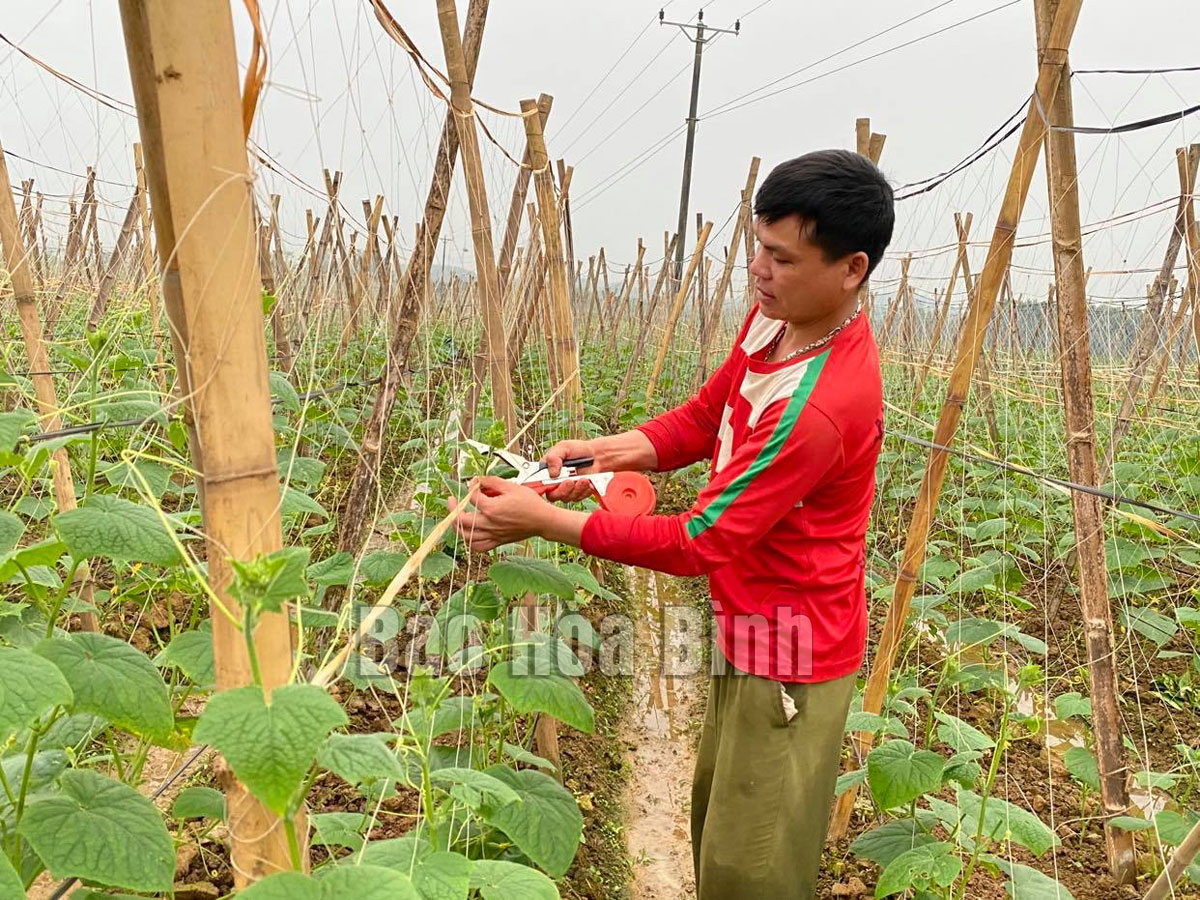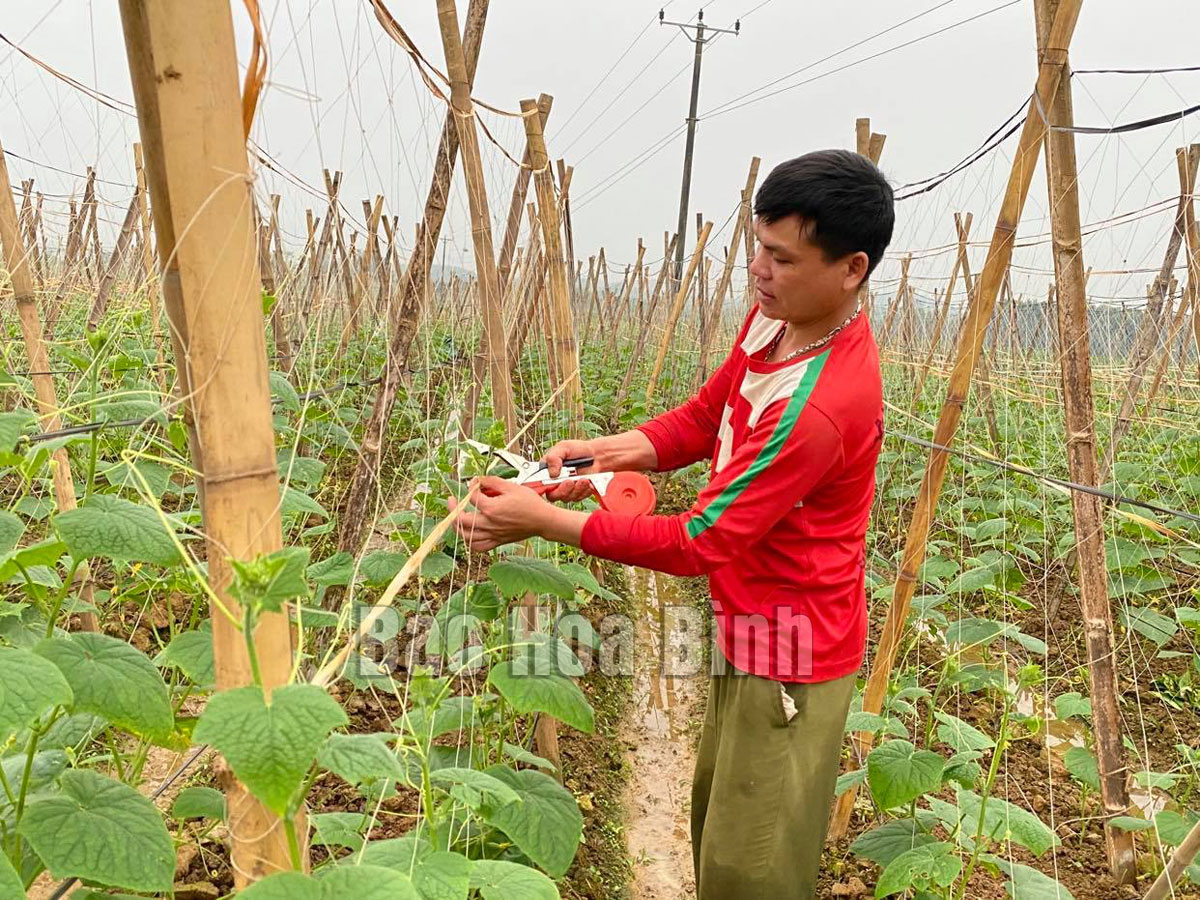
(HBO) - Farmers in Yen Phu commune of Lac Son district has experienced a difficult period as prices of some local key agricultural products, especially zucchini, dropped sharply amid the COVID-19 pandemic. However, the production-consumption linkage model between local farmers and enterprises has clearly proven effective.
Farmers in Trang Doi hamlet, Yen Phu commune (Lac Son district) grow melons in the direction of production-consumption linkage.
It is estimated that more than 50 households in the commune are growing baby cucumbers in the linkage model.
Trang Doi and Bo villages record the highest number of households participating in the model.
Statistics show that about 10 hectares of baby cucumbers planted under the model in the commune, including over 6ha in Trang Doi village, over 4ha in Vanh, Bo and Cat hamlets.
Baby cucumber growers in Yen Phu commune said that this is a short-term crop that can produce two crops per year from February to April, and from November to January in areas where water is guaranteed for farming. Each crop lasts three months.
Currently, land accumulation has been implemented widely in the commune, while irrigation systems have been constructed and upgraded synchronously, facilitating the shift of crop structure and production-consumption linkage.
Chairman of the Yen Phu commune People's Committee Bui Van Canh said this model has proven effective and is being expanded in the locality, contributing to improving the efficiency of the shift of crop and livestock structure.
The commune’s Party Committee and authority have also encouraged local farmers to grow more plants with high economic value, he said.
Training courses have been held for local farmers to help them update effective cultivation and husbandry techniques, and information on market and prices he said.
The local authority has also encouraged local residents to develop concentrated and safe goods production areas to meet the demand of the market, he said.
A safe and sustainable vegetable cultivation model with the aim of improving incomes for local farmers has been formed in Hung village, he added./.
According to data from the Hoa Binh Provincial Party Committee, the industrial production index for the first six months of 2025 is estimated to have increased by 20% compared to the same period last year. This marks the highest year-on-year growth rate for this period since 2020.
In the first six months of 2025, Hoa Binh province’s export turnover was estimated at 1.145 billion USD, marking an 18.11% increase compared to the same period in 2024. Import turnover was estimated at $ 804 million, a 17.15% increase, which helped the province maintain a positive trade balance.
The lives of the ethnic minority farmers in Tan Lac district have gradually improved thanks to the new directions in agricultural production. This is a testament to the collective strength fostered through the professional associations and groups implemented by various levels of the district’s Farmers’ Union.
With the motto the "product quality comes first,” after nearly one year of establishment and operation, Muong village’s Clean Food Agricultural and Commercial Cooperative, located in Cau Hamlet, Hung Son Commune (Kim Boi district), has launched reputable, high-quality agricultural products to the market that are well-received by consumers. The products such as Muong village’s pork sausage, salt-cured chicken, and salt-cured pork hocks have gradually carved out a place in the market and they are on the path to obtaining the OCOP certification.
In the past, the phrase "bumper harvest, rock-bottom prices" was a familiar refrain for Vietnamese farmers engaged in fragmented, small-scale agriculture. But today, a new spirit is emerging across rural areas of Hoa Binh province - one of collaboration, organisation, and collective economic models that provide a stable foundation for production.
Maintaining growing area codes and packing facility codes in accordance with regulations is a mandatory requirement for agricultural products to be eligible for export. Recently, the Department of Agriculture and Environment of Hoa Binh province has intensified technical supervision of designated farming areas and packing facilities to safeguard the "green passport" that enables its products to access international markets.



